An 18 year decline in American manufacturing may be drawing to a close, a result of tougher trade stances by the Trump Administration and its domestic tax policy.
Echoing a campaign theme, The President recently told reporters that “China has taken hundreds of billions of dollars a year from the United States…I explained to President Xi we can’t do that anymore…” The administration has consistently stated that Beijing reduce its $375 billion merchandise trade surplus by least $200 billion within the next two years, and has threatened to impose $150 billion in tariffs if an agreement is not reached.
Within two months of President Trump’s inauguration, AFL-CIO President Richard Trumka noted: “America’s working families welcome the Department of Commerce’s examination of China’s economy. A thorough assessment is necessary to ensure American workers are competing on a level playing field. Any fair analysis of the facts will reaffirm that China’s extensive government involvement merits “nonmarket economy” treatment so that the U.S. can properly address dumped, underpriced goods and services that hurt U.S. workers and producers.”
In response to Trump’s demands, China has agreed to purchase more American products and services, although total amounts and other details have not been agreed upon, and many difficulties remain.
The history of American concessions to China that substantially harmed American businesses and workers has substantial tie-ins to the Clinton Administration, which was enmeshed in serious related scandals, largely underreported by the press. The (Bill) Clinton campaign was illegally the recipient of funds from China, and the Clinton Administration provided highly questionable technological and economic benefits to Beijing, (including the sale of Cray supercomputers despite significant protests from U.S. security personnel) and legislation normalizing trade relations, prompting significant protests from labor unions.
Those objecting to the Clinton concessions have been proven correct. China has leapfrogged decades of high tech development, particularly in its military, thanks to the Cray computers.
Rense.com explains that “…the Clinton administration approved the export of a Sun supercomputer directly to the Yuanwang Group. The Sun supercomputer was moved to the National Defense Technical Institute in Changsha, part of the Lop Nor nuclear weapons facility, for atomic bomb design… There is ample evidence that Clinton administration officials were aware that Yuanwang was a company owned by the Chinese military. According to the Commerce Department’s own documents, official meetings with Chinese army owned companies took place before documented computer transfer to Yuanwang Corp.” The embarrassed Clinton White House had to take back the computers following the revelations.
Over masturbation is nothing but a bad habit and might leads to a lot of zinc which boosts sex hormone production, and also essential fatty acids which help create prostaglandins which are crucial to sexual health. cialis canadian Kamagra Oral Jelly is a more affordable option, which is why it is becoming very popular. canada pharmacy viagra It is very much available in the online pharmacies. 50mg sildenafil generic is the cheap solution of the disease. It works, is to relax the arterial wall, which intern leads to decreased pulmonary cialis without prescription arterial resistant and pressure.
Also, despite promises to the contrary, China has not abided by reasonable trade practices following normalization of commercial relations. Its resulting domination of several industries have resulted in decimating American industrial production and the loss of vast numbers of manufacturing jobs. U.S. News reports that within the first 13 years since normalization, 3.2 million American factory jobs were lost.
During the 2016 presidential campaign, Slate’s Jordan Weissman, noted: “Things have not worked out quite as the 42nd president hoped. Normalizing trade with China set our rival on a path to becoming the industrial powerhouse the world knows today, decimating American factory towns in the process and upending old assumptions about how trade effects the economy. Thanks to a growing body of academic research, we’re only just now beginning to understand the extent of the economic fallout…”
The Huffington Post’s Jane White explains that the major beneficiary of Clinton’s policy “were Wall Street, Chinese factory owners and U.S. banks and the biggest losers were blue collar workers. Mitt Romney may have run a company that outsourced jobs but Clinton ran a country that did…. As Richard McCormack pointed out in the American Prospect, in the beginning of this century American companies stopped making the products Americans continued to buy, from clothing to computers. Manufacturers never emerged from the 2001 recession, which coincided with China’s entry into the World Trade Organization. Between 2001 and 2009 the U.S. lost 42,400 factories and manufacturing employment dropped to 11.7 million, a loss of 32 percent of all manufacturing jobs. The last time fewer than 12 million people worked in the manufacturing sector was in 1941.”
The tide may be turning. According to the Federal Reserve, “Industrial production rose 0.7 percent in April for its third consecutive monthly increase…The indexes for mining and utilities moved up 1.1 percent and 1.9 percent, respectively. At 107.3 percent of its 2012 average, total industrial production in April was 3.5 percent higher than it was a year earlier.”
A CNBC report found that the manufacturing industry has added roughly 293,000 jobs since President Trump’s election, according to the Department of Labor data.
Illustration: Pixabay
